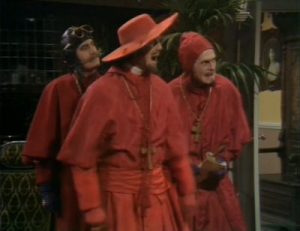
Towards the bottom of any list of cheerful Russian novels, you will find Fyodor Dostoyevsky’s Brothers Karamazov in which Dmitri is arresting for killing his father Fyodor in order to get the money he needs to pay back his lover Katerina so he can run off with Grushenka who has since run off with Kalganov while Dmitiri’s brother Alyosha is visiting Ilusha after visiting Father Zossima on his deathbed and after Smerdyakov tells Ivan, Dmitiri’s other brother, that he is afraid Dmitiri might murder Fyodor who everybody thinks is the father of the epileptic servant Smerdyakov who hangs himself during Dmitiri’s trial. And Kolya gives Ilusha a dog.
In the middle of this, Dostoyevsky pens a parable about freedom which has become a staple of existential thinking even before there was existentialism. In it, Jesus returns to the 17th century in Seville where the Spanish Inquisition arrests him and finds him guilty of being himself. The Grand Inquisitor is a fairly insightful fellow and he also has a nack for getting to the point pretty quickly. Given that they are going to burn Jesus at the stake as soon as it gets light enough to see through the eye holes of his pointy hood, he gets to the point right away. Jesus made a lot of mistakes, he says, and the biggest one was to not take Satan up on at least one of his three offers designed to set Jesus and his followers up for life: turning stones to bread, impressing the crowd by tossing himself off the temple and not hitting the ground, and play second fiddle to the devil himself, for just a minute or two mind you, in exchange for the opportunity to run the whole earthly show by himself. This would mean that Jesus’ followers would always have enough to eat and always have a leader who was both charming and smart.
The cost for this Shangri-La? Freedom. If Jesus had just agreed, they would have given up their freedom but gained a boatload of happiness. By turning this package down, Jesus doomed people to think for themselves, make their own decisions and generally sleep in their own beds. And that, says the Grand Inquisitor, means that they can never be happy. The church, on the other hand, really cares about people and set things up so they could, in fact, be happy.
““For only now has it become possible to us, for the first time, to give a serious thought to human happiness. Man is born a rebel, and can rebels be ever happy?” The implication is, no, they can’t. Rebels always sit in the corner with their backs to the wall because they can never be sure that they didn’t piss off the guys in charge. But if someone is told exactly what to think, and thinks it, and if their friends are all on board and are quick to tell them what a wonderfully good person he or she is, then it’s easy to be happy.
But not so easy to be free.
Of course, no one likes to think she or he gave in to the Man. So there is always a symbolic effort to exert one’s independence. Ride to Live. Rage against the machine. You’re not the boss of me. Dostoyevsky anticipated this and the Grand Inquisitor admits that there will be times when the plucky among us don our denim jacket with the anarchy symbol on the back and flip off the powers that be. Here’s what he says about that:
“Man is weak and cowardly. What matters it, if he now riots and rebels throughout the world against our will and power, and prides himself upon that rebellion? It is but the petty pride and vanity of a school-boy. It is the rioting of little children.”
But the guy who really stands his ground, makes his choices and lives with the fallout, knows the next critical decision will define him for now and forever and doesn’t pass the buck and keep the change – he’s free.
I don’t imagine he has many friends, but he knows who the guy in the mirror really is. And he has only himself to thank or blame for that.
